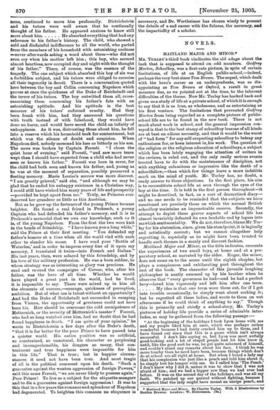given us a study of life at a private school,
of which it is enough to say that it is as true, as wholesome, and as entertaining as his first venture. The limitations that prevented Godfrey Marten from being regarded as a complete picture of public- school life are to be found in the new hook. There is not much about work in school, and the general impression con- veyed is that to the best stamp of schoolboy lessons of all kinds are at best an odious necessity, and that it would be the worst of "bad form" for any self-respecting schoolboy to betray any enthusiasm for, or keen interest in, his work. The question of the religion or the religious education of schoolboys, a subject which has been lately engaging the attention of writers in the reviews, is ruled out, and the only really serious events treated have to do with the maintenance of discipline, not with anything calamitous or impressive like the death of a schoolfellow,—than which few things leave a more indelible mark on the mind of youth. Mr. Turley has, no doubt, a ready answer to these objections. In the first place, his aim is to reconstitute school life as seen through the eyes of the boy at the time. It is told in the first person throughout—it might be described, in fact, as a sort of dramatised diary— and no one needs to be reminded that the subjects we have mentioned are precisely those on which the normal British schoolboy maintains an impenetrable reserve. Secondly, the




















































 Previous page
Previous page